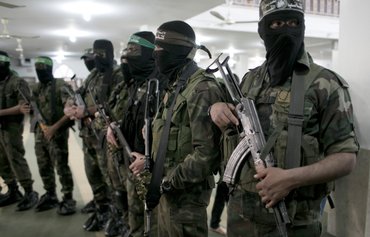Palestinians in the Gaza Strip are paying a heavy price for the support the Iranian regime and affiliated groups provide to top Gaza officials, a local Palestinian official in Shejaiya neighbourhood said Monday (January 6th).
The funding cuts to the UN Relief and Works Agency for Palestine Refugees in the Near East (UNRWA) have heavily impacted the organisation's humanitarian work, he told Al-Mashareq on condition of anonymity.
These cuts were announced after Hamas and the Damascus-based Palestinian Islamic Jihad (PIJ) started mending their ties with Iran and Lebanon's Hizbullah after years of disagreements over the Syrian war.
Iran is a longtime financial supporter of Hamas and the PIJ. Both groups are labelled as terror organisations by the US.
The alliance of PIJ and Hamas with Iran does not reflect popular sentiment in Gaza, the official said.
Palestinians in Gaza even welcomed the recent killing of Iran's Islamic Revolutionary Guard Corps Quds Force (IRGC-QF) commander Qassem Soleimani, he said.
Images of Gazans distributing sweets to mark the occasion were circulated on social media soon after Soleimani's death.
Alliance with Iran hurts the people
The US announced on September 1st, 2018 it was ending all its funds to UNRWA.
The agency supports more than five million Palestinians in Gaza, the West Bank, Jordan, Syria and Lebanon, including providing health care, education and social services.
The US has been the largest single donor to UNRWA, providing $364 million in 2017 and funding almost 30% of its operations in the region.
The decision to stop or reduce support to UNRWA was not confined to the US, as other countries followed suit, including Arab countries, said the Gaza official, who works in the healthcare sector.
This is for several reasons, he said, the first being that the US Treasury has sanctioned leaders of PIJ and Hamas.
"The other reason is that there are concerns these leaders may benefit from the humanitarian aid," he added.
"Therefore, we are now trying to find a better way through which support can be provided directly to needy families in Gaza," he said. "This is a complex and difficult task, but the leaders who opted to join hands with Iran are held responsible for that."
Qatar has been contributing to humanitarian relief efforts in Gaza by distributing cash subsidies directly to needy families, he said.
In November, postal banks in Gaza started to distribute $7 million in small grants from Qatar to 70,000 impoverished Palestinian families in the territory.
Western aid to Gaza
Gazans, as well as other Palestinians who were affected by the drop in UNRWA capabilities in Lebanon, Jordan and Syria, "now realise that the reason for their suffering is the poor choices taken by political and armed leaders in having ties with Iran and Hizbullah", the Gaza official said.
Western countries want "tangible guarantees" from Hizbullah that it will cease its support of groups in Palestine, Syria and Iraq in order to facilitate the transfer of funds to the poor and needy, said Gaza activist Ali al-Manaseer.
"Hizbullah is taking advantage of [Palestinians] to achieve more influence and expansion," he said, "while the people pay the price for that because donors are concerned over the fate of their aid and in whose hands it will fall."
The Iranians have offered nothing to the Palestinians, "as all education, health and development projects are the result of contributions from Western and Arab countries, including the US, Britain, Canada, Japan and Gulf states", said Ashraf Khalil, a Palestinian researcher with the King Hussein Foundation's Information and Research Centre in Jordan.
Before the US aid to UNRWA ended, the US had funded the construction of an integrated prosthetic centre in western Gaza to help war victims, he told Al-Mashareq.
"It also funded an adult literacy centre and sewing centre for women," he said, adding that school supplies were also provided to students.
Other countries helped with projects, such as child vaccination, repair of homes, and water and sanitation projects, said Khalil.
"The important question now is: did Iran compensate for this shortage?"
"Absolutely not," he said.
Iranians are still using Palestinians "to expand their influence in the region and form allied militias, with the Palestinians getting nothing in return", he said.
As to ways of confronting the financial crisis in Gaza and within UNRWA itself, Khalil said the solution lies in "ending all relations" with Iran.

![A Palestinian man carries on his shoulder a sack of flour received from a UN Relief and Works Agency (UNRWA) distribution centre in the southern Gaza Strip refugee camp of Rafah, on November 17th. [Said Khatib/AFP]](/cnmi_am/images/2020/01/06/21809-Gaza-UNRWA-aid-600_384.jpg)




